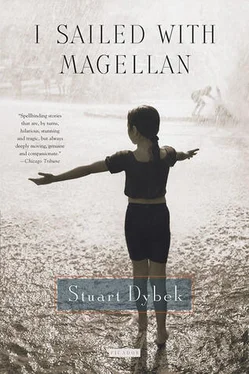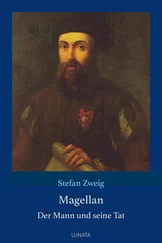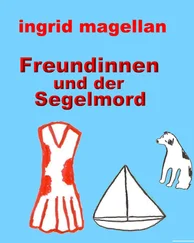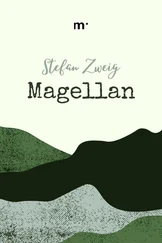Stuart Dybek - I Sailed with Magellan
Здесь есть возможность читать онлайн «Stuart Dybek - I Sailed with Magellan» весь текст электронной книги совершенно бесплатно (целиком полную версию без сокращений). В некоторых случаях можно слушать аудио, скачать через торрент в формате fb2 и присутствует краткое содержание. Год выпуска: 2004, Издательство: Farrar, Straus and Giroux, Жанр: Современная проза, на английском языке. Описание произведения, (предисловие) а так же отзывы посетителей доступны на портале библиотеки ЛибКат.
- Название:I Sailed with Magellan
- Автор:
- Издательство:Farrar, Straus and Giroux
- Жанр:
- Год:2004
- ISBN:нет данных
- Рейтинг книги:4 / 5. Голосов: 1
-
Избранное:Добавить в избранное
- Отзывы:
-
Ваша оценка:
- 80
- 1
- 2
- 3
- 4
- 5
I Sailed with Magellan: краткое содержание, описание и аннотация
Предлагаем к чтению аннотацию, описание, краткое содержание или предисловие (зависит от того, что написал сам автор книги «I Sailed with Magellan»). Если вы не нашли необходимую информацию о книге — напишите в комментариях, мы постараемся отыскать её.
story writer Stuart Dybek returns with eleven masterful and masterfully linked stories about Chicago's fabled and harrowing South Side. United, they comprise the story of Perry Katzek and his widening, endearing clan. Through these streets walk butchers, hitmen, mothers and factory workers, boys turned men and men turned to urban myth.
solidifies Dybek's standing as one of our finest chroniclers of urban America.
I Sailed with Magellan — читать онлайн бесплатно полную книгу (весь текст) целиком
Ниже представлен текст книги, разбитый по страницам. Система сохранения места последней прочитанной страницы, позволяет с удобством читать онлайн бесплатно книгу «I Sailed with Magellan», без необходимости каждый раз заново искать на чём Вы остановились. Поставьте закладку, и сможете в любой момент перейти на страницу, на которой закончили чтение.
Интервал:
Закладка:
“After you read it I kept thinking about it and saw what you meant,” Camille said. “How it was like a little miracle for the ant to bring the first bread to Jesus, who’d later make the big miracles of the loaves and fishes, and turn bread and wine into his body and blood.”
I’d never thought about any of that. To me it was just the adventure of an ant.
“The Enormous Gift” had been chosen to be read aloud in class, but it didn’t win the school competition. Camille won with “O Little Star of Centaurus,” a story in which the Christmas star was revealed to be a spaceship in the shape of a winged horse. I couldn’t help visualizing it as the fiery red Pegasus trademark for Mobil gasoline. It had traveled from the constellation Centaurus, where light-years ago Christ had appeared to redeem an advanced but brutal race of hooved aliens. The Centaurians, now converted to brotherhood and peace, had learned that Christ was traveling through the universe, redeeming world after world, and so in homage they followed him through time and space to witness each reappearance. The gleam of their ship was the star that guided the Wise Men, who in each new world came bringing gifts on each new night of Christ’s infinitely repeated birth.
“Your story knocked my socks off,” I said, not adding that, ever since I’d heard her read it, I’d wondered if the Christ on Centaurus had hooves like the other Centaurians. Her story didn’t say, but it posed problems for his crucifixion.
“Thanks,” she said, “but I thought yours should have won.”
“No way. They should make yours into a movie. How’d you make that up?”
“How’d you think of the ant?”
“I don’t know. I like to read about bugs and stuff,” I said, not mentioning how during the summers I’d sneak off down the railroad tracks to the Sanitary Canal, where I hid a homemade net for collecting butterflies.
“I never purposely try to make things up,” Camille said, sounding suddenly proper, the way she did when she spoke in class. “It just happens. It’s not about made-up anyway, it’s about feeling.”
She looked at me for agreement, but the transformation in her voice put me on guard.
“It’s about feeling, you know?” she repeated. “That’s what’s important,” she insisted, as if I’d disagreed.
She went back to cleaning the erasers, clapping them together like cymbals, the poofs of chalky smoke surrounding her bronzed by the rays that shafted through the clouds massed over the convent. She stared at the two chalk-dust letters I’d pounded on the bricks, and back at me, then beat in a blocky C.
“Want to collaborate?” she asked.
I stood there, confused again, refusing to admit to myself that she intimidated me, but feeling hopelessly immature beside her all the same.
“So, come on,” she said and beat out the slanted upper bar of the missing K .
I beat an impression of the straight staff. She added the lower slanted bar. Not much chalk remained on the erasers, and they left only the faded ghost of the word. I became conscious that my heart was beating.
She read our collaboration aloud as if it were composed of air flowing across her overbite, as if a whisper re-created its faintness on the bricks.
“Don’t look so surprised. You don’t know what I think,” she said, then added, “I have stories I don’t show anyone.”
“Like what?”
“I don’t think someone should be blamed for stories any more than they should have to confess their dreams. Boys don’t have to confess their dreams. Do you?”
It was something I’d never thought about, and I wasn’t sure what she was getting at. If she was referring to wet dreams, they were something I’d yet to experience. Later, in high school, I’d think back to the two of us behind the school and realize that was what she probably meant, but at the time all I did was shrug.
She hunched her skinny shoulders, mimicking me. “Maybe I’d tell you if I thought you could keep a secret,” she said.
“Sure I can;” I told her.
“It would have to be a trade. First you have to tell me something you want me to keep secret.”
“What if I don’t have a secret?”
“Everybody has. But if you’re an exception then make one up.”
I knew that collecting butterflies wasn’t the kind of secret she was after. Even at the time, it seemed strange to me that we’d been in school together for years and hardly talked and now suddenly we were having a conversation of the kind I’d never had before with a girl or anyone, a conversation that, whether Camille knew it or not, was already a secret I would keep. I laughed as a way out of answering.
“What do you have to do penance for?” she asked.
“You mean the old five Our Fathers and five Hail Marys?” I said. In my experience that was the penance no matter what you confessed. I didn’t know if it was the same for girls or not.
Camille looked at me unamused. “Have you ever written a story that was a sin, one you had to do penance for?”
“Penance for a story?”
She gathered the erasers into an unbalanced stack and turned to go inside, leaving me to pick up the erasers that dropped behind her. “You’re a big help,” she said sarcastically but added, “Honest. I knew you weren’t a loser.”
That night, I went to sleep thinking about her — another secret — and looking forward to the following day, when we’d go out together to beat the erasers. I didn’t know what I’d tell her, but I’d tell her something. But next morning, during the Pledge of Allegiance, before class even began, Diane Kunzel, Norky’s Partner in Christ, let out a scream. Norky had Magic-Markered a smiley face on a white sausage-shaped balloon he’d worked through his open fly as if exposing himself. Sister Mary Donatille attacked him, slashing at his greasy d.a. haircut and stabbing at his balloon with the pointer she used during geography when she stood before the pull-down map that was green for Christian countries and pink for Communist ones. Partners in Christ came to a bitter end that morning.
“Don’t cry, girls, these boys would try the patience of an angel,” Sister Mary Donatille said.
Camille wasn’t crying. She showed her teeth in a quick, regretful overbite smile and fluttered her fingers goodbye as I packed up. We boys were reassigned to seats at the perimeter of class, and for the remainder of seventh grade I never really spoke with Camille again.
But I still thought about her when in eighth grade we were asked to write our last Christmas composition and dedicate it to Ralphie. I wanted to write a story, not a composition, one that would be read aloud, so that Camille would hear it.
Unfortunately, I didn’t have a story to write. I wanted a story that came out of nowhere, one I could get excited about the way I had when I’d written from the viewpoint of an ant, although writing about an ant seemed wimpy now. Sister Lucy had made it clear that dedicating our compositions to Ralphie didn’t mean we were to write about him. Simply writing, as usual, about the true meaning of Christmas was all that was required. Yet, when I thought about Ralphie, already dead a year, tales about an ant or a red-nosed reindeer or a snowman come to life seemed the childish fantasies of a daydreamer, a term my father applied to me when he was feeling particularly contemptuous of my behavior.
“You better wake up and smell the coffee,” he’d warn.
Getting desperate, I tried to write a story my father had told once about the first Christmas he’d spent as a child after his father had been sent to the state mental hospital, and how on a bitterly cold Christmas Eve he met a boy named Teddy Kanik, who became his best friend for life. It wasn’t like any story my father had told me before. He told it after I’d accused him of being a Scrooge because of his cheapskate way of shopping for a Christmas tree. Before I could get to the story as my father told it to me, it seemed necessary to explain the annual ordeal that shopping with him for a Christmas tree had become. Each Christmas season, Mick and I would trudge after him from one tree lot to another in the cold. He was a comparison shopper. He insisted we drag along a sled for hauling back the tree, the way we had when we were little kids. Mick and I would argue over who got stuck pulling the old red Flexible Flyer, its rusted runners rattling over the partially shoveled sidewalks. It had become our family tradition — a terribly embarrassing one. My father loved to bargain, and everything, including the way he’d browse the rows of Christmas trees, shaking his head at their overpriced and undernourished condition, was part of a master strategy. His opening gambit on anything he bought, Christmas trees not excluded, was always the phrase “So how much you soak for it …”
Читать дальшеИнтервал:
Закладка:
Похожие книги на «I Sailed with Magellan»
Представляем Вашему вниманию похожие книги на «I Sailed with Magellan» списком для выбора. Мы отобрали схожую по названию и смыслу литературу в надежде предоставить читателям больше вариантов отыскать новые, интересные, ещё непрочитанные произведения.
Обсуждение, отзывы о книге «I Sailed with Magellan» и просто собственные мнения читателей. Оставьте ваши комментарии, напишите, что Вы думаете о произведении, его смысле или главных героях. Укажите что конкретно понравилось, а что нет, и почему Вы так считаете.












